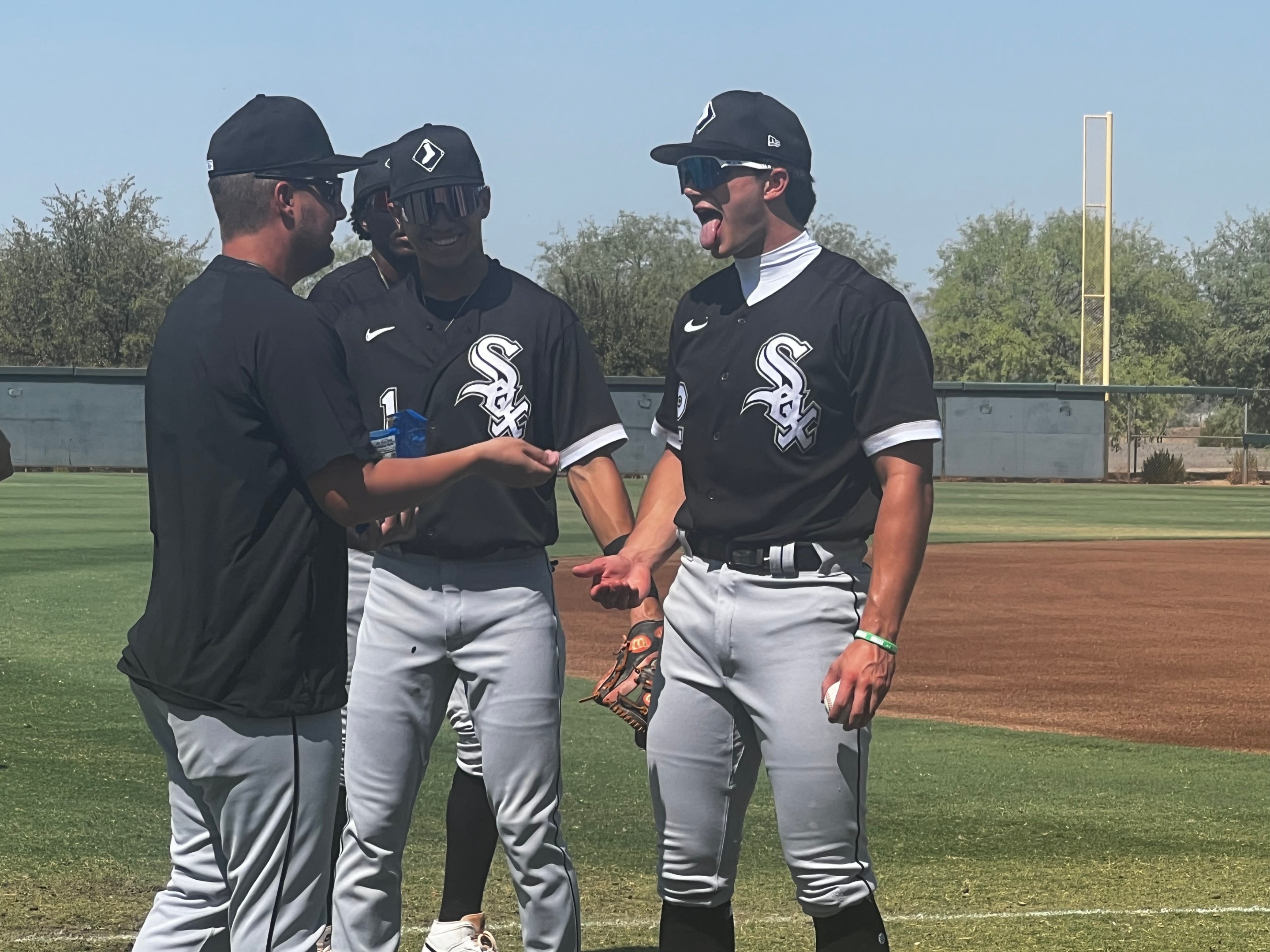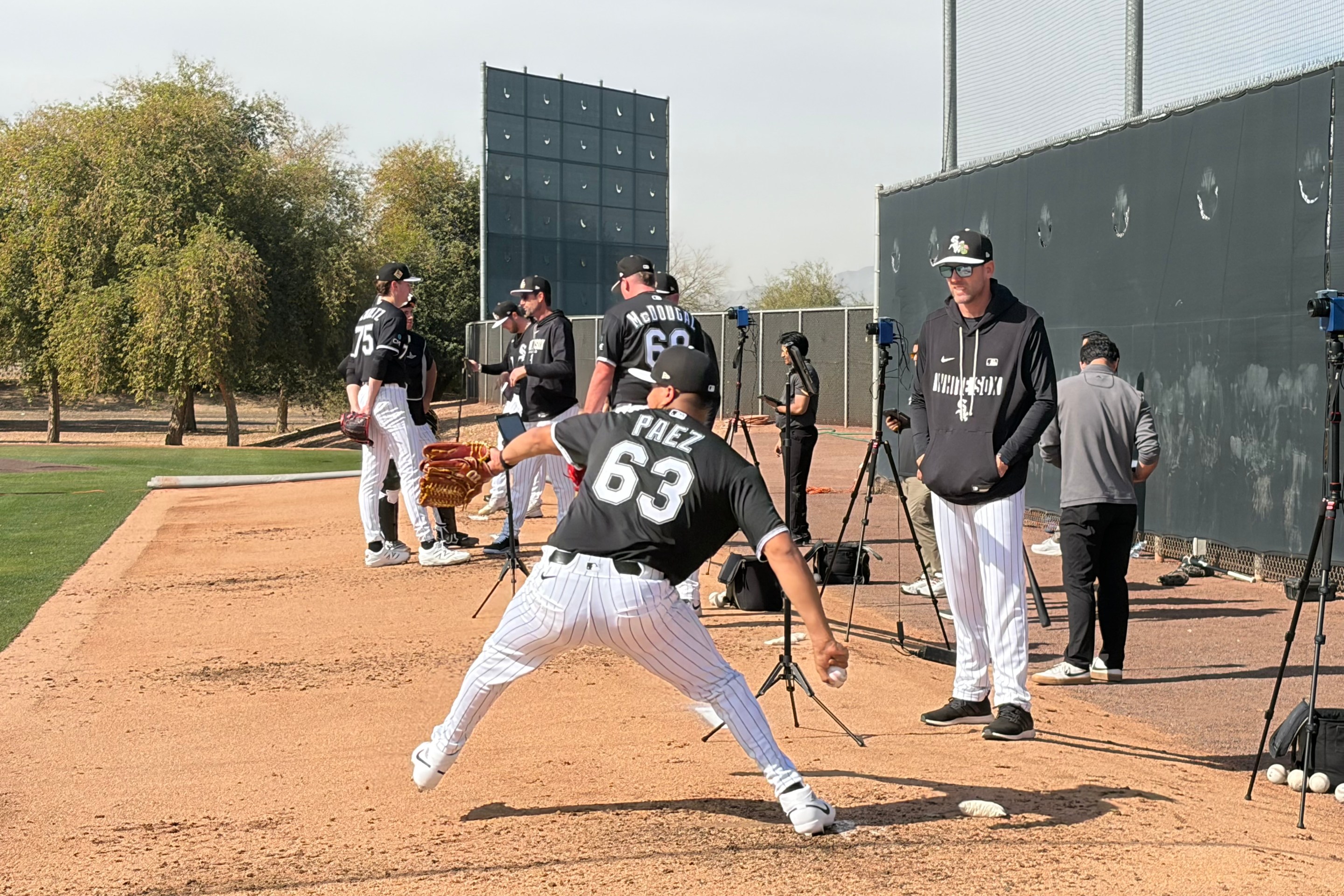Jaden Fauske can hit.
Maybe it's too soon to say that about an 18-year-old that the White Sox just signed for $3 million out of the second round of last month's draft, but much of his life has already been shaped around that premise, and the promise of his hit tool.
"Summer two years ago, first time playing the national circuit, realizing the ability I have with the bat and realizing that's going to be my calling card 10 years from now, and I wanted to make sure I didn't jeopardize that," Fauske said. "That's kind of why I decided to shift away from catcher. Moving to the outfield, realizing I had more value than just being a guy who could hit and then throw in a corner, to being a guy who could be plus defensively as well."
This desire drove Fauske to, by his own description, "change" his body. He's younger than his bridge league counterparts Billy Carlson and Matthew Boughton, but makes them look skinny and more projectable with a frame that wouldn't look out of a place in Double-A Birmingham.
As White Sox scouting director Mike Shirley alluded to on draft night, Fauske's 60-yard dash times once sat over seven seconds and were a sore point of his pre-draft profile going into senior year. But through dieting and explosive movement training, Fauske has gotten himself to a place where the White Sox are at least going to provide him some opportunity to play center field in the minors. Fauske is known for being a local product and being on the same high school team as Jim Thome's son Landon -- whom he totally thinks the White Sox should draft next July -- and his senior year at Nazareth Academy often found him lugging around a Yeti cooler full of food that aligned with his strict new regimen.
"Not eating the chicken tenders in the lunch line," Fauske joked. "I was very locked in with [my diet]. Pretty much every day I ate the same thing. I'm not necessarily not ever eating anything bad. You've still got to have fun here and there, but I was very detailed and focused."
"Detailed and focused," might represent one of Fauske's higher order compliments. It's a good summary of why he says he likes the work environment of bridge league, and the ample room for scrutinizing imperfections in his bat path and working on his outfield reads that it affords.
"We're getting better every single day here, and there's a lot I have to learn," Fauske said. "Especially being only 18 years old, I don't know what I don't know. And I think that being here is the best environment to prepare me for the next season."
Ask him about his favorite insight from his days of having a Hall of Famer as an assistant coach, and Fauske will talk about times that Thome taught him how to spy pitch grips, recognize sequences and pitcher tendencies, and the "game within the game." Ask him about the left-handed swings he tried to model as a kid, and be prepared to watch Josh Hamilton's hands the next time you see an old highlight of the former MVP. Ask Fauske about something general he's working, and you will hear his mind parsing through the intricacies that make it possible.
"I just like the rhythm he has with his hands and how smooth it transitions into his swing, the way he drops the barrel," Fauske said of Hamilton. "I've always had this little wiggle in my hands. I feel my hands moving in a circular motion with the way I manipulate the barrel back into my load. Sometimes I get in trouble when I get too stiff with my hands, and I get out of that rhythm and it disrupts the timing of that whole process."
Maybe not quite to the degree of Ray Charles or Stevie Wonder, but Fauske's hands are his livelihood, the source of virtuosity that make it worth waiting to see how many other skills he can bring up to average. White Sox director of hitting Ryan Fuller lauded how Fauske's swing path puts him in position to spray fastballs and breaking balls he's waited on to left field when his barrel catches balls at the back of the strike zone, and still allows him to pull and lift pitches he catches out front. Fauske responds to a rehash of this description by injecting that it's something he still needs to get better at, but his path to maturing into the power he'll need to be a standout if/when he ends up in an outfield corner resides in not forsaking the properties that power his hit tool.
Fauske enjoys the battery of different drill work that he puts his swing through -- "overload and underload weight-wise, skinny barrel, short bat, heavy bat, long bat, all sorts of stuff" -- because of the larger truths about his stroke that the different challenges shake out, and how it trains him to stay committed to its basics.
"It's forcing your swing to adapt to different environments, and in the drill work you're making it more difficult than it would be in a game, so you're just challenging yourself in different ways," Fauske said. "Obviously your swing is your swing, and if you have a different bat in your hands, it's not changing your swing. It's just trying to stay consistent."
In keeping with his commitment to this routine, Fauske thinks his overweighted bat work will continue to build his bat speed, and that he still has "a ton of room" to add strength to a frame, since he believes he already managed to get leaner without compromising his strength.
"Power will come," Fauske said. "It's not a top of the line priority because it's something that I believe will come with time."
And in what is counterintuitively rare among 18-year-olds, Fauske talks like time is on his side. He knows his ability to make contact and spray line drives all over the yard should one day carry him to the majors, but would like to have some other elements of his game working by the time it does.
Both his heart (didn't dream he'd end up on his favorite childhood team) and his head (didn't think he would be getting selected at the point in the draft where the Sox had picks) are in disbelief at his current residency at the White Sox complex in Arizona. But Fauske praised the transparency the team had with mapping out their plan for him, and liked the idea of detailed and focused work to prepare himself for playing affiliated ball next season.
In a year's time, Fauske wouldn't mind seeing his former teammate Landon Thome in a similar position. The reasons he thinks it would work are very on-brand.
"He's a dude, he's really good," Fauske said. "And if you've followed him for some time now, you'd know that every time he steps on the field he's better than he was before."
It would have sufficed to just say that he thinks he can hit, but Fauske tends to drill down a bit deeper than that.






